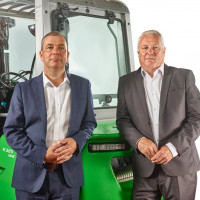MEETING THE CHALLENGES OF STAGE V LEGISLATION
New European Stage 5 regulations, aimed at reducing emissions from forklifts, will affect all non-road mobile machinery manufactured from 30 June 2021 onwards. From 31 December 2021, all new non-road mobile machinery placed on the market will need to comply with the legislation.
These rules, which apply to both diesel and LPG forklift trucks, have been described as the world’s toughest emission standards, and are designed to improve air quality to protect public health and the environment.
Miles Griffin, General Manager of Cesab Material Handling UK explained:
“From the end of 2021, all new machine purchases will need to meet Stage 5 legislation, including those between 56 and 130kw and under 37kw. They will be required to produce 40% less emissions of particulate matter, or a maximum 0.015g per kw of soot, regardless of engine size.”
Manufacturers will need to show engines are compliant with Stage 5 by putting an emission mark on each engine that can be viewed through the engine access cover. This mark should include the name, manufacturer trademark, engine family name, date of production and a serial number. Engines without this mark will not be compliant.
For LPG trucks, emissions of particulate matter are not an issue, but a catalytic converter is required to eliminate nitrous oxides. The biggest impact is on the diesel forklift market, where the main solution to meeting these requirements has been a diesel particulate filter.
Diesel particulate filters are used to prevent the discharge of soot when an automotive engine is adapted to emit less nitrous oxide. This adaptation includes lowering the combustion temperature using cooled exhaust gas but means that a diesel particulate filter is needed to deal with the resulting soot discharge.
Forklifts with diesel particulate filters usually need to be cleaned regularly, typically once or twice a week. This involves revving the engine for 20 to 30 minutes to burn the soot. The disadvantage of this, for many vehicles, includes high fuel use, increased downtime and lower productivity.
Miles said: “At Cesab, we’ve spent several years looking at how our IC range can fulfil Stage 5 regulations without compromising productivity and we’ve been working towards a solution that addresses the issues around diesel particulate filters. Our engineering team has taken a totally new look at the design of the engine, with the aim of producing an option that removes the problems and better meets business demands.”
